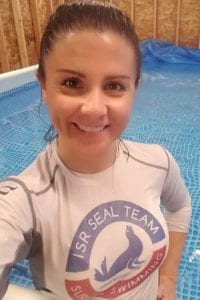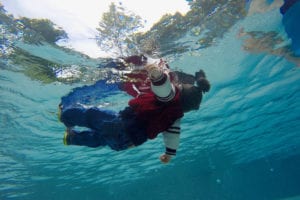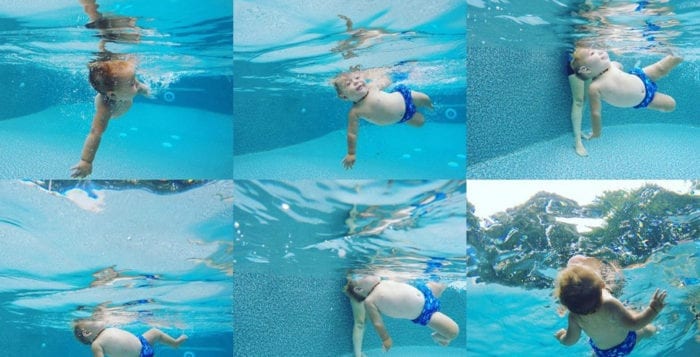For 10 minutes a day, five days a week, Kristine McCarren prevents tragedies.
As founder of the Long Island branch of Infant Swimming Resource (ISR) — a “self-rescuing” program that originated in Florida in 1966 — McCarren of Mount Sinai teaches children between 6 months and 6 years of age how to hold their breath underwater, wriggle onto their backs and float on the surface until help arrives in the event that they fall in water unsupervised. Since it began, she said, the technique has proven to be successful in saving more than 800 children from drowning — the leading cause of accidental death for children under the age of 4 in the United States.

“People worry about their children in car seats and preventing accidents there, but I don’t think they even think about how big of a problem drowning is,” said McCarren, who since 2013 has provided lessons, at ISR Seal Team Survival Swimming Inc. in Port Jefferson Station and Courtyard by Marriott in Ronkonkoma. She currently has 15 students of varying ages, who each go through a six-week program.
McCarren said unlike typical swim lessons, it’s best to teach the technique every day in small increments so the children are able to retain it.
“This program is about making swimming second nature,” she said. “If a child can learn how to crawl or walk, it’s the same thing — it’s a motor skill just like that. The repetition gets it into their muscle memory, so as soon as they hit the water, they know to flip back and float.”
McCarren said parents are encouraged to stay on the sidelines and not interfere as their child is learning, as hard as that might be initially. The children are tested in both winter and summer clothes, as most would be fully clothed in a drowning situation.
“Kristine is absolutely amazing and it’s insane what she’s able to do with them,” said Sarah Walters, who two years ago traveled every day from Babylon to Port Jefferson Station with her three children. “I know that’s absurd, but at the same token I don’t have to worry anymore. It’s the best investment I’ve ever made. We were at a party once and my daughter, [who was 2 at the time], fell into the pool. There were adults all over the place, but I didn’t have to panic. She just got herself to the surface and to the side. That peace of mind is worth every penny and hour spent driving.”
“After five weeks of the intense training and a little bit of tears, she can now save herself.”
— Nicole Delfino
McCarren got involved in early 2013 after seeing a picture of her then-18-month-old niece swimming underwater in Florida, where the program had been extremely popular for decades. A physical therapist at the time, with a doctorate from Stony Brook University, the lifelong lover of water quickly decided to travel down to Florida to get certified as an ISR instructor. She went through an intensive, eight-week training program that, on top of in-water, hands-on training, included education in physiology, anatomy and child psychology.
Melissa Larsen, who brought her 14-month-old son to McCarren for lessons in 2016, became so inspired by her and the program that she became an ISR instructor herself, training in New Jersey. She currently teaches ISR in Hauppauge and Garden City.
“Seeing what [McCarren] did with my own son was incredible,” Larsen said. “She has patience and she’s thoughtful in what she’s doing. We have a pool in our backyard, and even if we didn’t, I think it was a necessary skill for him to have.”
The program has been especially essential and therapeutic for those in the area who have suffered water-related tragedies like Nicole Delfino, a Centereach mother whose 15-month-old daughter Kyleigh died after falling into a pool at a family party Aug. 15, 2016. Delfino said Kyleigh was in a crowded living room while she was helping her 5-year-old daughter Liliana in the bathroom. Kyleigh found her way outside and into the pool.

“Kyleigh was bright,” Delfino said. “She had her whole life ahead of her, and it was taken away in an instant.”
Only a few months after Kyleigh’s passing, Delfino enrolled Liliana in the program to make sure something like what happened to Kyleigh never happened again. Her 6-month-old daughter will begin ISR lessons in a few weeks.
“After five weeks of the intense training and a little bit of tears, she can now save herself,” she said Liliana. “It means everything to me, and she’s phenomenal in the program. If my daughter [Kyleigh] would’ve taken ISR lessons, she could have fallen into the pool, gained her composure and floated on her back until she was able to literally swim to the side of the pool.”
She said she encourages any parent to enroll their child in the program.
“I would highly suggest it to anyone, because at the end of the day, who is responsible to save them are themselves,” Delfino said. “All the layers of protection — you should have a gate around your pool and you should have an alarm — can fail, and if they do, you and only you can save yourself.”
McCarren and Delfino are in the process of starting a nonprofit in Kyleigh’s name to provide ISR scholarships to children whose siblings have drowned. For more information on the ISR program, visit ww.isrnewyork.com or on Facebook at www.facebook.com/ISRSealSchoolLI.





